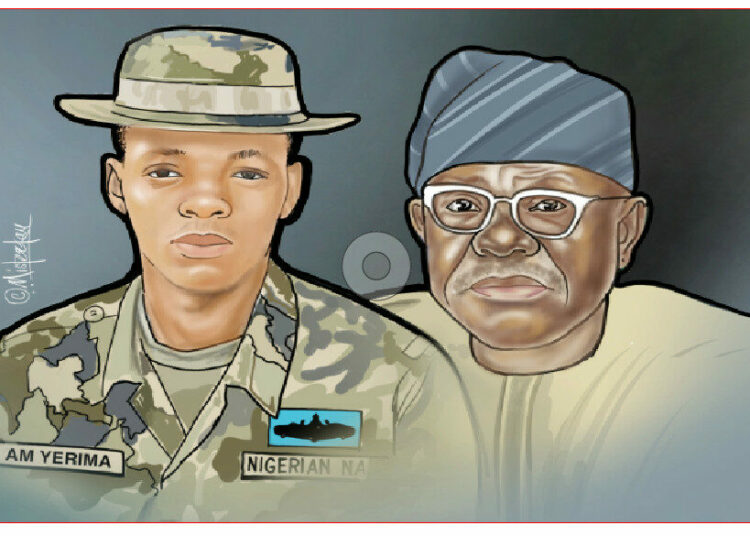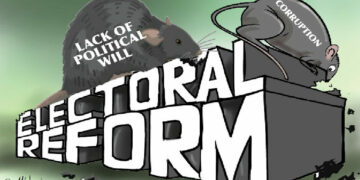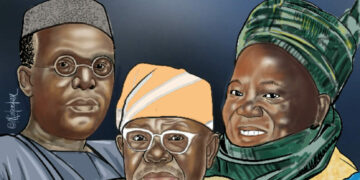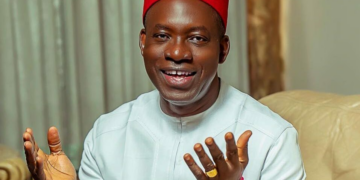There are few countries where a single video clip can tell the story of an entire republic. Nigeria, however, specializes in such symbolic episodes. Last week’s confrontation between FCT Minister Nyesom Wike and Navy Lieutenant A. M. Yerima was one such moment: a small incident with the misfortune of describing a much larger truth about the Nigerian state. It was not merely a quarrel over access to a disputed plot in Gaduwa; it was a window into the deeper structural problems of power, procedure, and personality that shape public life in this country.
As a citizen, and as someone who places institutional integrity above individual theatrics, the encounter was both amusing and depressing. On the one hand, it gave us comic relief in a period of national exhaustion. On the other hand, it exposed, yet again, the fragility of our governance culture and the stubborn personalization of public authority.
Like any useful moment in statecraft, this episode deserves more than social media laughter. It deserves sober reflection.
The Minister, the Lieutenant, and the Theatre Nigeria Never Tires Of
Wike arrived at the controversial property in the manner he has become synonymous with: loud, assertive, fully convinced of his righteousness, and with an audience to witness the performance. His constitutional power over FCT land is not contested. He is, by law, the delegated authority of the President regarding land administration. But power is not simply what the law confers; it is also how the holder deploys it. And this is where the incident becomes instructive.
In classical political theory, authority is strongest when it is exercised quietly. Max Weber warned in his writings that the routinization of power – not its dramatization – creates stable institutions. But Wike often seems to treat governance as an arena where the loudest gladiator wins. His approach suggests a belief that procedure is optional, emotional restraint is unnecessary, and the optics of dominance are more important than administrative clarity.
Standing between him and his chosen path was Lt. Yerima: young, calm, and bound by military procedure. Yerima was not there because he owned the land, believed in the land, or particularly cared about who wanted to enter the land. He was there because he was ordered to guard it. Nigerian officers do not choose their postings like tourists pick hotels. They obey. Yerima obeyed.
And that obedience – simple, quiet, procedural – proved to be the only stabilizing force in an encounter where a civilian minister abandoned the emotional intelligence expected of public office.
When Wike insulted him, Yerima did not reciprocate. When handed the phone to speak to the Chief of Defence Staff, his first instinct was to remove his hand from his pocket out of respect. Then he stated his orders calmly. Then he returned the phone. He did not move the minister. He did not move himself. He simply held his institutional line.
That moment – more than the conflict itself – became a cultural reset for millions of Nigerians.
A Mirror to Nigeria: Where Personality Overrides Procedure
What we witnessed was more than a clash of two men. It was a public demonstration of how Nigerian governance often functions: the overwhelming influence of personality over process, of ego over regulation, of emotional impulsiveness over institutional maturity.
If Nigeria were a person, its greatest weakness would be its inability to separate public authority from personal temperament. This is why our civil service can be overridden by a phone call, why court orders are frequently ignored, and why powerholders often behave like proprietors of the state rather than custodians of it.
Last week did not create this reality; it merely broadcast it with better camera angles.
The incident echoes patterns familiar in history. In ancient Rome, leaders like Tarquin the Proud lost legitimacy not because they lacked authority, but because they wielded it with unrestrained arrogance. Their downfall came when citizens realized that the state had been reduced to one man’s temperament. Conversely, when Cincinnatus relinquished personal power for the sake of the republic, Rome experienced its most stable period. History consistently teaches the same lesson: institutions thrive when leaders control themselves; they deteriorate when leaders insist on controlling everything else.
Nigeria has not yet fully absorbed this lesson.
When Ethnicity Becomes a Convenient Escape Route
Instead of confronting the real governance questions, some commentators immediately began introducing ethnicity into the conversation – claiming that Yerima’s calm resistance was celebrated only because he was Northern and Wike Southern. This framing is not only inaccurate; it is intellectually lazy.
The public’s response to Yerima was not regional; it was emotional. Nigerians saw in him a behaviour rarely displayed by those in uniform: discipline in the face of provocation, respect in the face of insult, and composure in the face of political bluster. They appreciated not the man’s ethnicity, but the man’s restraint.
To insist on an ethnic reading of the episode is to fundamentally misunderstand both the incident and the country. Nigerians were not cheering a tribe; they were cheering a moment of institutional sanity.
The Lawyer, the Law, and the Limits of Legalism
Then came Prof. Sebastine’s (SAN) essay, a legal treatise insisting that Yerima should face a court-martial for obstructing a public official performing his constitutional duties. He invoked sections, subsections, and constitutional clauses with the energy of a man preparing for an Olympic event in citation.
But while the law is essential, it is not always sufficient for explaining institutional behaviour. Law without context becomes blunt. Law without administrative reasoning becomes punitive. And law without emotional intelligence becomes tyranny in uniform.
Our institutions cannot run on statutes alone. They require interpretation, proportionality, and an understanding of how systems actually function in real life. The SAN was not wrong legally; he was simply blind to the practical and procedural realities that govern civil-military operations. He treated the encounter as a courtroom problem, when it was in fact a governance problem.
Wider Lessons for a Country in Search of Itself
Wike is a symptom, not the disease. His behaviour illustrates a systemic pattern across Nigeria: elites who exercise power without accountability, bypassing rules for personal or networked advantage. Lieutenant Yerima’s professionalism offers a corrective model. It shows that discipline, procedural adherence, and emotional intelligence stabilize institutions even when confronted by ego-driven authority.
The Gaduwa incident should therefore serve as a case study for Nigeria: the importance of institutional fidelity, the consequences of personalizing power, and the necessity of emotional intelligence in leadership. Until these lessons are internalized, Nigeria will continue to witness spectacles of personal ego overriding procedure, authority undermining itself, and public trust in institutions eroding.
The country will change not when dramatic figures shout at gates, but when quiet professionals guard them with integrity.
A Nation at a Crossroads
What Nigeria saw last week was not just a quarrel. It was a warning. A reminder that institutions are fragile when leaders believe their emotions are part of the constitution. A reminder that professionalism is powerful. And a reminder that the future of this country depends not on the loudness of its officeholders, but on the strength of its institutions.
We can laugh at the drama. But we must learn from it.





